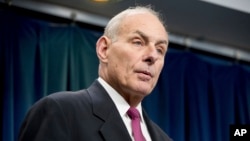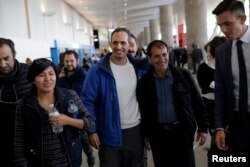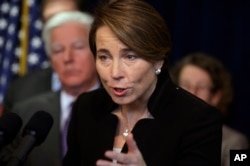Three of the top U.S. immigration law enforcers on Tuesday defended the White House executive order last week that has sparked fierce public criticism, multiple lawsuits and nationwide protests.
At a news conference, Department of Homeland Security officials acknowledged miscommunication over President Donald Trump's sweeping immigration order, but denied reports of widespread confusion over its implementation.
Homeland Security chief John Kelly also downplayed the impact of the travel restrictions, insisting the move does not represent a travel ban, but a "temporary pause that allows us to review the existing refugee and vetting system."
"It is not, I repeat, it is not a ban on Muslims," Kelly added. "The Homeland Security mission is to safeguard the American people, our homeland, our values. And religious liberty is one of our most fundamental and treasured values."
WATCH: Kelly on Trump's immigration order
Trump’s order blocks visitors for 90 days from seven Muslim majority countries – Iran, Iraq, Libya, Somalia, Sudan, Syria and Yemen. Trump officials have said more countries could be added. It also bars entry to refugees from anywhere in the world for 120 days, and indefinitely bans Syrian refugees.
After reports that hundreds were detained upon entering the U.S., spontaneous mass protests broke out at airports across the country. Many demonstrators say the move amounts to a thinly disguised attempt to implement part of Trump's controversial campaign promise to ban Muslim immigration.
Who is Affected?
There has been confusion about which travelers are affected by the order, and Tuesday's news conference offered some clarification. DHS officials reaffirmed that permanent legal residents, or green card holders, are exempt from the restrictions. They also said dual citizens will be judged based on which passport they present to customs officials.
Kelly insisted that DHS was adequately consulted ahead of the rollout, and that his agency was not taken by surprise by what he called a "fairly clear" executive order.
But some officials at DHS have told VOA they are still unclear about how to implement the order. A state of "confusion" prevails inside DHS, according to a staffer involved in the refugee vetting process. “Many terms within the executive order remain undefined, ambiguous and vague,” said the staffer, speaking to VOA on condition of anonymity.
Other aspects remain undetermined, including Trump's proposed "extreme vetting" of immigrants. According to Kelly, "various options" are being considered, including examining social media postings, cell phone contacts and website browsing history.
Kelly also suggested that many of the countries on the list from where immigrants are banned may not be taken off after 120 days. "I'd be less than honest if I told you that some of the countries that are currently on the list may or may not be taken off the list anytime soon," he said.
Federal judges already have halted parts of the executive order. But some civil rights groups and members of Congress have said Customs and Border Protection agents at some airports have refused to comply with the rulings, including those that require detainees access to legal representation.
Kelly on Tuesday disputed those charges. "To the best of our knowledge, no CBP officers knowingly, intentionally, violated a court order," he said.
After the news conference, the American Civil Liberties Union, which has filed many of the lawsuits against the order, said in a Twitter message: "Failure by government to comply is unacceptable. First ensure those threatening noncompliance are aware of the orders, then call the ACLU."
More lawsuits, including some that challenge the entire law, have been filed.
WATCH: Trump Defends Executive Order, Criticizes Schumer


